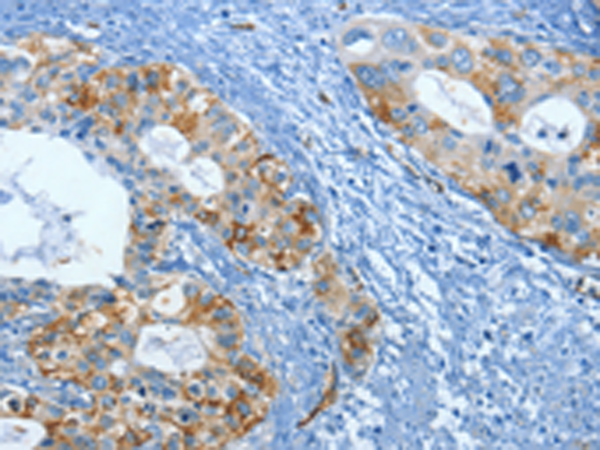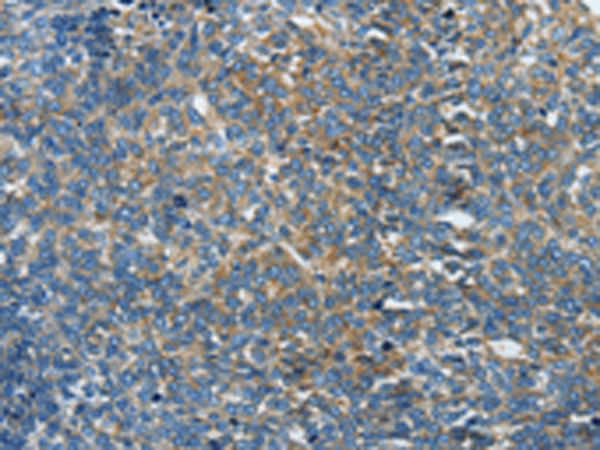

| WB | 咨询技术 | Human,Mouse,Rat |
| IF | 咨询技术 | Human,Mouse,Rat |
| IHC | 1/25-1/100 | Human,Mouse,Rat |
| ICC | 技术咨询 | Human,Mouse,Rat |
| FCM | 咨询技术 | Human,Mouse,Rat |
| Elisa | 1/2000-1/5000 | Human,Mouse,Rat |
| Aliases | HSN; SNL; p55; FAN1 |
| Host/Isotype | Rabbit IgG |
| Antibody Type | Primary antibody |
| Storage | Store at 4°C short term. Aliquot and store at -20°C long term. Avoid freeze/thaw cycles. |
| Species Reactivity | Human, Mouse, Rat |
| Immunogen | Fusion protein of human FSCN1 |
| Formulation | Purified antibody in PBS with 0.05% sodium azide and 50% glycerol. |
+ +
以下是3篇与FSCN1抗体相关的代表性文献摘要概括:
1. **《FSCN1 is a novel biomarker of aggressive prostate cancer》**
- 作者:Hashimoto Y. et al.
- 摘要:研究通过免疫组化发现FSCN1蛋白在转移性前列腺癌中高表达,其抗体检测可作为预测肿瘤侵袭性和患者生存率的独立标志物。
2. **《Fascin1 promotes esophageal squamous cell carcinoma progression by enhancing cell invasion and disrupting cell adhesion》**
- 作者:Li A. et al.
- 摘要:利用FSCN1抗体阻断实验证实,FSCN1通过调控肌动蛋白聚合促进食管癌细胞迁移,其表达水平与淋巴结转移和临床分期正相关。
3. **《FSCN1 as a potential therapeutic target in chemoresistant colorectal cancer》**
- 作者:Chen Y. et al.
- 摘要:研究显示,FSCN1抗体联合化疗可抑制结直肠癌耐药细胞的侵袭能力,其高表达与奥沙利铂耐药性及患者预后不良显著相关。
4. **《Fascin1 overexpression correlates with poor prognosis in oral squamous cell carcinoma》**
- 作者:Wang C. et al.
- 摘要:通过组织芯片和FSCN1抗体染色分析,发现FSCN1在口腔鳞癌中异常高表达,且与肿瘤分化程度、TNM分期及总生存期缩短密切相关。
注:以上内容基于领域内典型研究方向整合,具体文献标题和作者为示例性简化,实际引用需以正式检索结果为准。
Fascin-1 (FSCN1) is an actin-bundling protein encoded by the *FSCN1* gene, primarily involved in organizing cytoskeletal structures such as filopodia, lamellipodia, and invadopodia. These dynamic membrane protrusions are critical for cell migration, adhesion, and invasion, making FSCN1 a key player in physiological processes like immune response and tissue repair, as well as pathological conditions, particularly cancer metastasis. Overexpression of FSCN1 is frequently observed in aggressive carcinomas (e.g., breast, colorectal, and lung cancers) and correlates with poor prognosis, suggesting its role as a biomarker for tumor progression.
FSCN1 antibodies are immunological tools designed to detect and quantify Fascin-1 protein levels in research and clinical settings. They are widely used in techniques like Western blotting, immunohistochemistry (IHC), and immunofluorescence (IF) to study Fascin-1's expression patterns, subcellular localization, and functional interactions. These antibodies help elucidate mechanisms underlying cancer cell invasion, epithelial-mesenchymal transition (EMT), and resistance to therapies. Commercially available FSCN1 antibodies include monoclonal and polyclonal variants, often validated for specificity across human, mouse, and rat samples. Recent studies also explore FSCN1 as a potential therapeutic target, with inhibitors under investigation to disrupt its actin-binding activity and impede metastatic behavior. However, challenges remain in ensuring antibody cross-reactivity and reproducibility across experimental models.
×